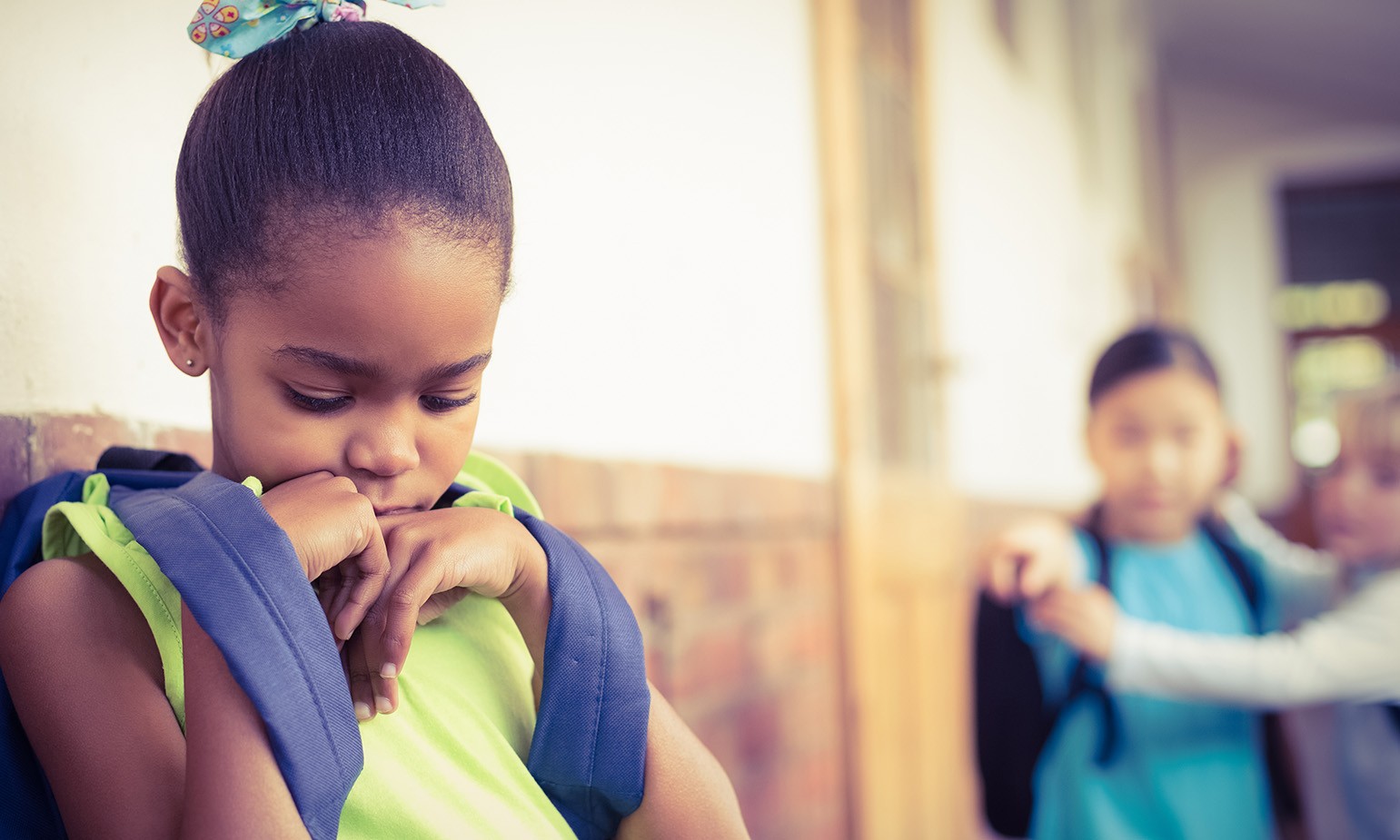
How to Deal With Bullies: A Guide for Parents
Mean kids aren't just a middle-school problem. The trouble has trickled to the youngest grades. Learn how to spot it—and how to protect children of all ages from bullies at school.
Bullying can exist in many forms: It can be physical (pushing, punching, or hitting); verbal (name-calling or threats); or psychological and emotional (spreading rumors or excluding someone from a conversation or activity).
And with the pervasive use of social media, inappropriate behavior between kids can occur outside of school hours via emails, text messages, and Facebook posts. These exchanges, known as cyberbullying, can be particularly hurtful and aggressive, and their harmful effects are often brought back into school the next day.
The first step to dealing with bullies is knowing when your child is a victim.
"Typical bullying symptoms include physical complaints such as tummy aches, as well as worries and fears, and a child not wanting to go to school," says Steven Pastyrnak, Ph.D., the Division Chief of Psychology at Helen DeVos Children's Hospital in Grand Rapids, MI. "A normal defense is to avoid or withdraw from things that are making her stressed."
These symptoms are exclusive to bullying though. “You still need to find out what's going on," says Lauren Hyman Kaplan, a school counselor and a specialist in social-emotional education and bullying prevention.
Ask questions and get your kids talking about their social situation. Know which friends they're getting along with and which ones they're not. "Establishing good communication should start well before the kids are having bullying problems," Dr. Pastyrnak says. "Keep it very general for the younger kids, but if you suspect a problem or if your child has vocalized a problem, press for more details.”
As kids get older, they have a significant awareness of peer relationships, so you can be more direct with your questions. When your kids talk, really listen to what they share and keep your own emotions in check.
"Often parents will get angry or frustrated, but children don't need you to overreact. They need you to listen, reassure, and support them. They need to see you as stable and strong and able to help them in any situation." Kaplan says.
Once you've determined your child is being mistreated by peers, here are the smartest ways to deal with bullies, according to experts.
Stop the Bullying Before It Starts
Brainstorm solutions to stop bullying before it happens or escalates. Develop and prepare a toolkit of ideas for kids to use in tough situations when it can be hard for them to think straight.
Create a List of Responses
Practice phrases your child can use to tell someone to stop bullying behavior. These should be simple and direct, but not antagonistic: "Leave me alone." "Back off." "That wasn't nice."
He could also try, "Yeah, whatever," and then walk away. "The key is that a comeback shouldn't be a put-down, because that aggravates a bully," says says Michele Borba, Ed.D., a Parents advisor and author of The Big Book of Parenting Solutions.
Role-play "What If" Scenarios
Role-playing is a terrific way to build confidence and empower your child to deal with challenges. You can role-play the bully while your child practices different responses until she feels confident handling troublesome situations. As you role play, teach him to speak in a strong, firm voice — whining or crying will only encourage a bully.
Promote Positive Body Language
By age 3, your child is ready to learn tricks that will make her a less inviting target. "Tell your child to practice looking at the color of her friends' eyes and to do the same thing when she's talking to a child who's bothering her," says Borba. This will force her to hold her head up so she'll appear more confident. Also practice making sad, brave, and happy faces and tell her to switch to "brave" if she's being bothered. "How you look when you encounter a bully is more important than what you say," says Dr. Borba.
Keep an Open Line of Communication
Check in with your kids every day about how things are going at school. Use a calm, friendly tone and create a nurturing climate so he isn't afraid to tell you if something's wrong. Emphasize that his safety and well-being is important, and that he should always talk to an adult about any problems.
Build Your Child's Confidence
The better your child feels about himself, the less likely the bullying will affect his self-esteem. Encourage hobbies, extracurricular activities, and social situations that bring out the best in your child. Tell your child the unique qualities you love about him and reinforce positive behaviors that you'd like to see more.
"As parents, we have a tendency to focus on negative situations, but kids actually listen better when their good behaviors are reinforced," Dr. Pastyrnak says. Honoring kids' strengths and encouraging healthy connections with others can affect self-esteem, increase your kids' long-term confidence, and prevent any potential bullying situations.
Praise Progress
When your child tells you how she defused a harasser, let her know you're proud. If you witness another child standing up to a bully in the park, point it out to your child so she can copy that approach. Above all, emphasize the idea that your own mom may have told you when you were a kid: If your child shows that she can't be bothered, a bully will usually move on.
Teach the Right Way to React
Children must understand that bullies have a need for power and control over others and a desire to hurt people. They often lack self-control, empathy, and sensitivity. With that said, it's helpful for children to use these strategies when dealing with bullies:
- Don't let a bully make you feel bad. When someone says something bad about you, say something positive to yourself. Remind yourself of your positive attributes.
- Tell the bully how you feel, why you feel the way you do, and what you want the bully to do. Learn to do this with a calm and determined voice. Say, for example, "I feel angry when you call me names because I have a real name. I want you to start calling me by my real name."
- Don't reward the bully with tears. The bully wants to hurt your feelings, so act like his name-calling and taunts don't hurt. You can do this by admitting the bully is right. For example, when the bully calls you "fatty," look him in the eye and say calmly, "You know, I do need to start getting more exercise." Then walk off with confidence.
- Disarm the bully with humor. Laugh at his threats and walk away from him.
- Use your best judgment, and follow your instincts. If the bully wants your homework, and you think he is about to hurt you, give him your work and walk off with confidence. Then tell an adult what happened.
- Don't expect to be mistreated. When walking toward a group of children, think of them as being nice to you, and do your best to be friendly. Most important, treat others the way you want to be treated. Stand up for other students who are bullied, and ask them to stand up for you.
Take Action to Stop Bullying
Ultimately, it's up to parents to help young child deal with a bully. Help him learn how to make smart choices and take action when he feels hurt or see another child being bullied, and be ready to intervene if necessary.
Report Repeated, Severe Bullying
If your child is reluctant to report the bullying, go with him to talk to a teacher, guidance counselor, principal, or school administrator. Learn about the school's policy on bullying, document instances of bullying and keep records, and stay on top of the situation by following up with the school to see what actions are being taken. When necessary, get help from others outside of school, like a family therapist or a police officer, and take advantage of community resources that can deal with and stop bullying.
Encourage Your Child to Be an Upstander
Being an upstander (and not a passive bystander) means a child takes positive action when she sees a friend or another student being bullied. Ask your child how it feels to have someone stand up for her, and share how one person can make a difference. "When it's the kids who speak up, it's ten times more powerful than anything that we'll ever be able to do as an adult," says Walter Roberts, a professor of counselor education at Minnesota State University, Mankato and author of Working With Parents of Bullies and Victims.
Contact the Offender's Parents
This is the right approach only for persistent acts of intimidation, and when you feel these parents will be receptive to working in a cooperative manner with you. Call or e-mail them in a non-confrontational way, making it clear that your goal is to resolve the matter together. You might say something like:
"I'm phoning because my daughter has come home from school feeling upset every day this week. She tells me that Suzy has called her names and excluded her from games at the playground. I don't know whether Suzy has mentioned any of this, but I'd like us to help them get along better. Do you have any suggestions?"
Partner with Your School
Communicate with your child's school and report bullying incidences. "You can't expect the school staff to know everything that's going on. Make them aware of any situations," Kaplan says. Though more schools are implementing bullying prevention programs, many still do not have enough support or resources. "Parents and teachers need to be aware and get involved so that they can monitor it appropriately," Dr. Pastyrnak says. Learn how to start anti-bullying and anti-violence programs within the school curriculum.
Teach Coping Skills
If your child is being bullied, remind her that it's not her fault, she is not alone, and you are there to help. It's important for kids to identify their feelings so they can communicate what's going on; therefore, parents should talk about their own feelings. What parents shouldn't do, no matter the child's age, is assume that this is normal peer stuff that will work itself out.
"It should never be accepted that a child is being picked on or teased," Kaplan advises. Helping your child deal with a bully will build confidence and prevent a difficult situation from escalating.
Source: parent.com

